Toxic Foods for Dogs – Fruits, Vegetables and Nuts
Dogs are experts in sniffing out smelly, tasty food lying around and quickly gulping it down before you can snatch it away. They’ll also raid cupboards, fridges and garbage cans without you seeing. Then there are many people who want to spoil a dog by feeding them their table scraps.
But not all foods are “dog-friendly”. Knowing what foods are toxic to dogs is helpful in preventing accidental poisonings.
Here is a helpful list of foods for your dog to avoid and what to do if they do happen to eat it.
In this part we cover fruits, vegetables and nuts that can be toxic to dogs. To read about potentially toxic drinks and beans (like cocoa/chocolate) click here. To read about harmful and potentially toxic meats and fish click here. To read about potentially toxic ingredients click here.
Please remember, if you suspect your dog has ingested a toxic food, seek veterinary attention immediately.
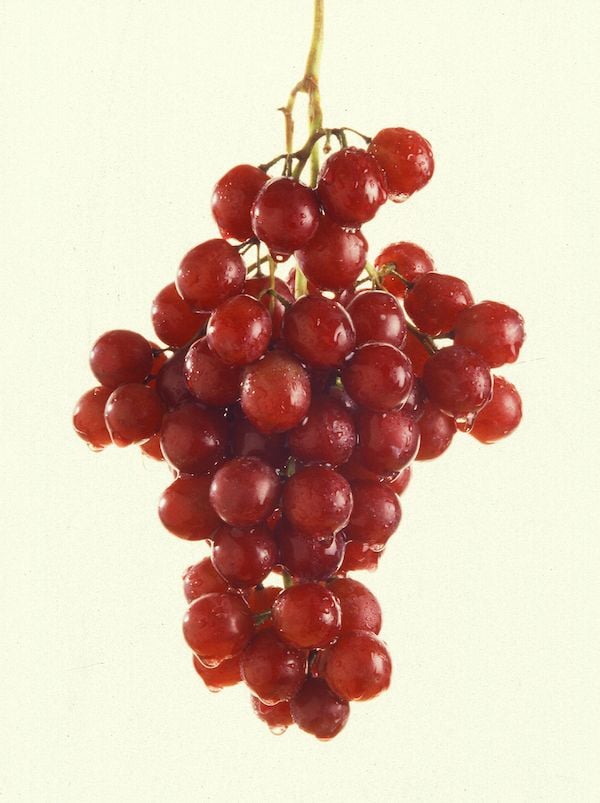
Grapes and Raisins
Eating as few as 4 to 5 grapes or raisins can be poisonous to a 20 pound (9 kg) dog, though the exact toxic dose will vary between dogs. Signs of toxicity occur within 24 hours and can start within few hours.
Symptoms: vomiting, loss of appetite, diarrhea, abdominal pain, decreased urine production, weakness and “drunken” walking.
Possible Outcomes: Can cause irreversible damage to the kidneys, possibly resulting in death.
Action:Take your pet to your vet or emergency clinic. The vet may start by inducing vomiting, or the stomach might be pumped (gastric lavage). Treatment involves aggressive supportive care – particularly fluid therapy and medications.


Onions, Garlic, Chives
Onions, garlic and chives can cause the destruction of red blood cells known as Heinz body anemia, a form of hemolytic anemia. No clear quantity has been established as to the onset of the anemia. But for garlic, if your dog consumes the equivalent of 1 teaspoon of garlic for every 10 pounds of their weight (1 teaspoon for a 10 pound dog) it can destroy red blood cells.
Poisonous reaction can result from raw, cooked or dried onions, garlic, chives, including those included in powdered or dehydrated forms. Avoid all foods that contain onions or onion variants (such as spaghetti sauce).
Symptoms: pale gums, rapid heart rate, weakness and lethargy, vomiting, diarrhea, and bloody urine.
Possible Outcomes: can cause irreversible damage to the kidneys, death.
Action: Take your pet to the vet or emergency clinic for care. The vet may administer blood transfusions and/or oxygen, followed by fluid therapy.


Avocados (entire plant: leaves, fruit, seeds and bark)
Avocados contain Persin, which can cause vomiting and diarrhea in dogs, and also trigger difficulty breathing, fluid accumulation in the chest, abdomen and heart, or pancreatitis. It is under debate as to whether or not the actual meat and oils are poisonous to dogs, with no scientific conclusions at this time. Note that avocado meat and oils are used in some dog products and foods.
Symptoms: problems breathing (loss of breath, wheezing), vomiting, diarrhea, nasal congestion, fluid accumulation in the dog heart and chest area.
Possible Outcomes: pancreatitis, oxygen deprivation leading to death.
Action: Take your pet to your vet or emergency clinic. The vet may start by inducing vomiting, or the stomach might be pumped (gastric lavage). Treatment involves aggressive supportive care including fluid therapy and medications.
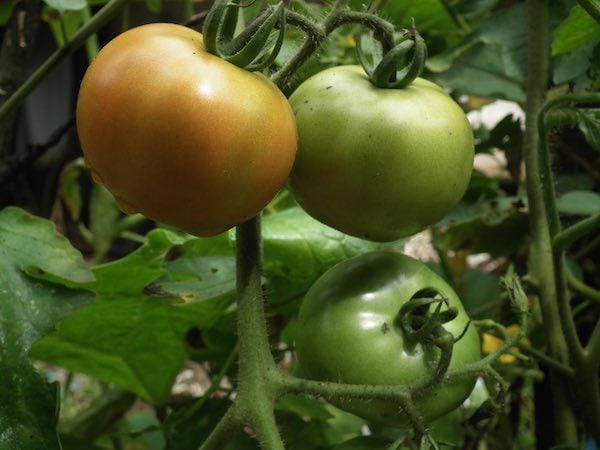

Tomato Plants (unripe tomatoes or the plant part)
Unripe tomatoes and the plant part of tomatoes contain tomatine, an alkaloid related to solanine and atropine. As the fruit ripens, the tomatine is metabolized. Therefore, ripened, red tomatoes are not likely to be harmful to a dog when eaten.
Tomato plants (the vines, stems and leaves), however, are toxic and can cause serious symptoms if eaten by a dog.
Green, unripened tomatoes can also be potentially harmful, but contain less of the toxic chemicals – tomatine and atropine – than the plant parts and therefore might simply cause stomach upset.
Atropine is concentrated in the vines and leaves of a tomato plant and can cause dilated pupils, tremors, and heart arrhythmias. Tomatine triggers abnormalities with the nervous system, kidneys and digestive tract.
Symptoms: Tremors, seizures, heart arrhythmias. Clinical signs of tomatine poisoning include lethargy, drooling, difficulty breathing, colic, vomiting, diarrhea or constipation, widely-dilated pupils, paralysis, cardiac effects, central nervous system signs (e.g., ataxia, muscle weakness, tremors, seizures), resulting from cholinesterase inhibition, coma and death.
Action: Take your pet to the vet or emergency clinic for care.
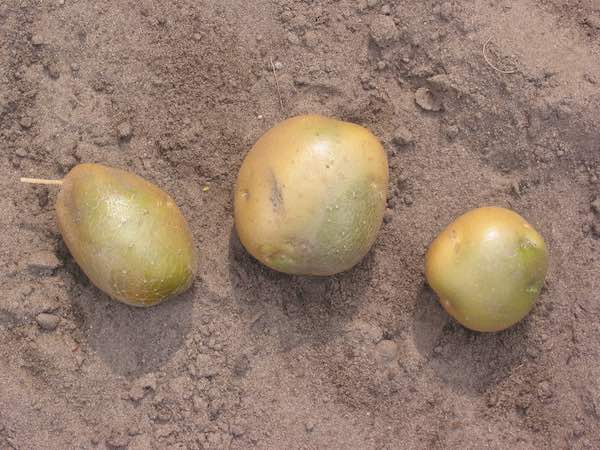

Raw and Green Potatoes
Eating potatoes that are raw or green or have a distinctive green rim between the peel and inside can be toxic because of solanum alkaloids that can cause solanine poisoning. Symptoms of solanine ingestion can include nausea, diarrhea, vomiting, stomach cramps, cardiac dysrhythmia, headache and dizziness.
Therefore, green potatoes should not be eaten by human or dog as they may get sick. Raw potatoes also contain oxalates (like tomatoes) which dogs can react to. Oxalates can trigger abnormalities with the nervous system, kidneys and digestive tract.
Note: Cooked potatoes appear to be fine for dogs and can be found in many commercial dog foods.
Symptoms of oxalates: Tremors, seizures, heart arrhythmias.
Action: Take your pet to the vet or emergency clinic for care.
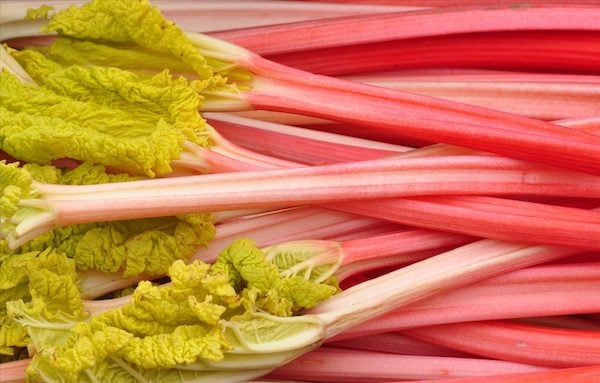

Rhubarb
Like tomatoes and raw potatoes, rhubarb contain oxalates, which trigger abnormalities with the nervous system, kidneys and digestive tract.
Symptoms: Tremors, seizures, heart arrhythmias.
Action: Take your pet to the vet or emergency clinic for care.
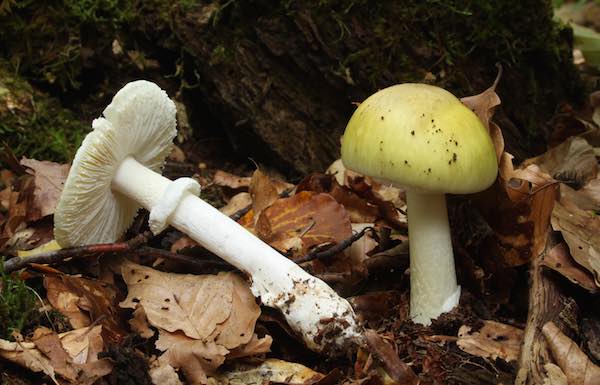

Mushrooms (wild / poisonous) – some mushrooms, (not all!)
While some mushrooms are totally fine for dogs, others can contain toxins are very dangerous for dogs, and in the worst cases, can result in the death.
Common white mushrooms appear to be safe for dogs to eat and are not considered dangerous foods for dogs. However, wild mushrooms are often poisonous.
The majority of fatal cases of poisoning are by the death cap mushroom (Amanita Phalloides), which are thankfully not used in cooking. It is best to consider all wild mushrooms potentially toxic to dogs.
Symptoms vary dependent on mushroom. They may include: nervous system abnormalities, anxiety, restlessness, slow heartbeat, wheezing, urination, salivation, diarrhea, seizure, coma, vomiting.
For death cap mushrooms symptoms include: profuse bloody diarrhea, nausea and vomiting, abdominal pain, dehydration, fever, and a rapid heart beat which lasts for approximately 24 hours. The next phase results in death within 3 to 7 days.
Possible Outcomes: organ failures (including kidneys, liver, brain), seizure, coma, vomiting, and death.
Action: Take your dog to the vet immediately. If possible collect a sample of the mushroom your dog has eaten for identification of the species of mushroom. Note: Do not store the mushrooms in a plastic bag. Use a paper bag, moist paper towel, or wax paper.
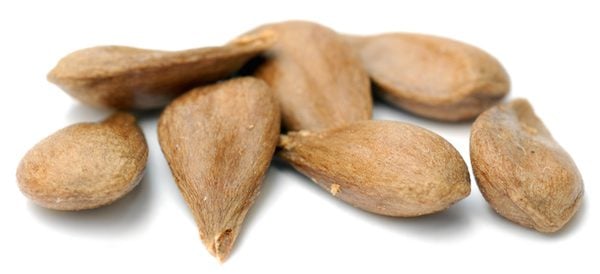

Fruit Pits and Seeds
Apple seeds, cherry pits, peach pits, and plum pits contain toxic cyanide, which is poisionous to dogs. Additionally, pits and seeds can cause intestinal obstruction.
Signs of intestinal obstruction may include: anorexia, vomiting, diarrhea, abdominal pain, lethargy, no appetite, swollen abdomen, fever, dehydration, and shock. Without treatment, death can occur within 3 to 4 days.
Symptoms of cyanide poisoning include: dilated pupils, apprehension, hyperventilation, shock, vomiting, panting, apnea tachycardia, cardiac arrhythmias, coma, skin irritation.
Possible Outcomes: cardiac arrest, coma, death.
Action: Take your pet to emergency vet care immediately. In some cases, antidotes are available. Other treatments include oxygen therapy, fluids and supportive care.
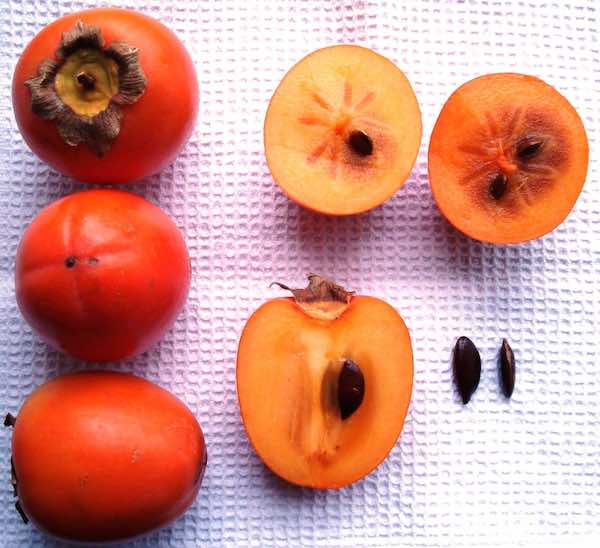

Persimmon Seeds
Persimmon seeds can cause inflammation of the dog’s intestine causing enteritis.
Symptoms: diarrhea and possibly a high temperature.
Action: Take your pet to the vet immediately. In some cases, antidotes are available. Other treatments include oxygen therapy, fluids and supportive care.
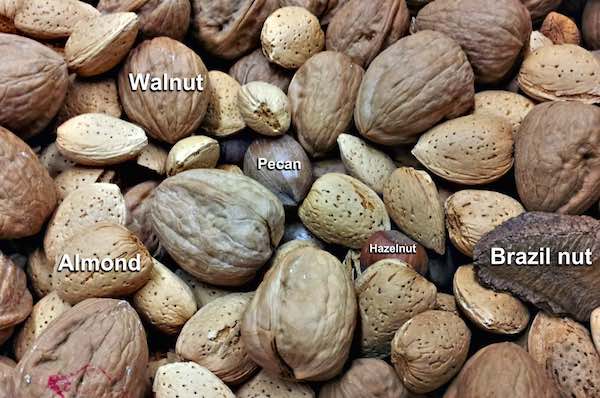

Tree nuts, such as walnuts, pecans, pistachios, and Brazil nuts
Tree nuts are often contaminated with very low levels of the poison Aflatoxin, which comes from the Aspergillus mold. Although levels are safe for humans, dogs are acutely sensitive to this poison, and even low levels of Aflatoxin can be extremely toxic and lead to complications such as gastroenteritis.
Other varieties of nuts such as walnuts can cause various other dog illnesses and dog poisoning. Nuts also have a high phosphorus content which causes the formation of bladder stones in dogs.
Peanut butter (non-salted) appears to be non-toxic to dogs, although peanuts themselves may have ill-effects on your dog.
Symptoms of Aflatoxin poisoning include: loss of appetite, lethargy, vomiting, orange-colored urine and jaundice, liver failure, blood-tinged vomit and bloody or blackened stools.
Possible Outcomes: Aflatoxin causes severe hepatocellular necrosis (acute liver failure) within 72 hours.
Symptoms of gastroenteritis include: persistent vomiting (sometimes bile may be seen in the vomit), dehydration and watery diarrhea. Lethargy, lack of appetite, stomach grumbling, and general listlessness.
Symptoms of bladder stones include: difficulty urinating, frequent “dribbling” urination, bloody urine, painful urination. This results in blockage of urinary tract due to bladder stones.
These episodes can be either acute (short lived), or last for several days.
Action: Take your dog to the vet for immediate treatment.
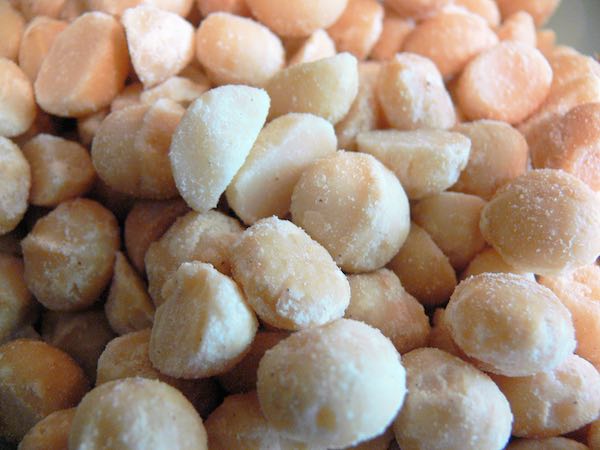

Macadamia Nuts
Generally, consumption of macadamia nuts will not be fatal, but can cause your dog to become extremely ill. The toxin in the nut is not known.
Ingestion of just a handful of nuts can cause adverse effects. As few as six macadamia nuts can trigger locomotory difficulties in dogs. Toxicity will typically evince within 6 to 24 hours.
Symptoms: vomiting, weakness, depression, lack of energy, drunken walking, joint/muscle pain, and joint swelling, tremors, ataxia, hyperthermia, abdominal pain.
Possible Outcomes: Severely sick. May require hospitalization.
Action: Take your pet to the vet if symptoms are not abating or large quantity of nuts is consumed. Dogs are typically treated symptomatically and recover uneventfully within 1 to 2 days. In-hospital supportive care may be recommended for dogs that become very sick.






